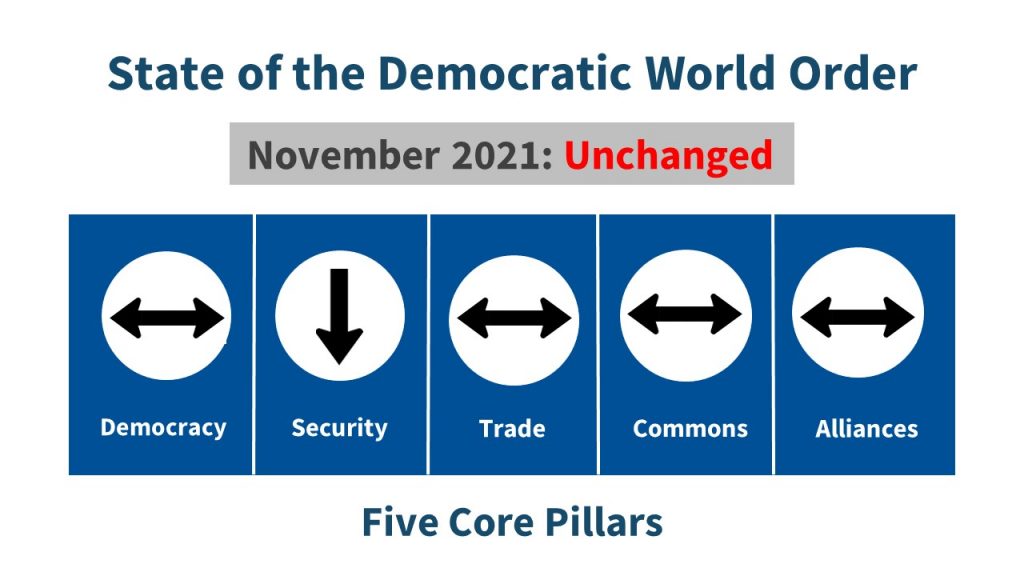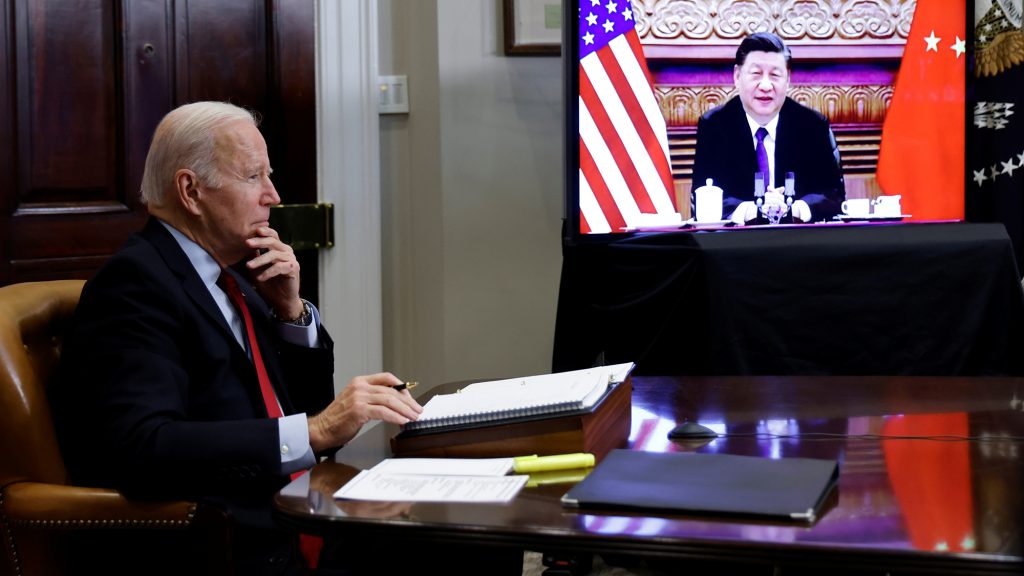Reshaping the order
This month’s topline events
Biden-Xi Summit. President Biden and Chinese President Xi Jinping met for several hours in a virtual summit that covered Taiwan, Beijing’s economic policies and human rights practices, climate change, nuclear and hypersonic weapons, and other topics. While both leaders expressed a desire to maintain constructive dialogue, Xi reportedly warned that US support for Taiwan was “playing with fire” and that engaging in “ideological demarcation” and “group confrontation” would “inevitably bring disaster to the world.”
- Shaping the order. The summit highlighted the Biden administration’s efforts to engage with Beijing and seek to manage differences, even as it reorients US foreign policy around a long-term strategic competition with China. But the summit also signaled a deepening divide between the two powers, as Beijing shows no signs of backing away from its ongoing assault on key tenets of the rules-based order.
- Hitting home. China’s activities represent a direct challenge to US security and economic interests, as well as US support for democracy and human rights.
- What to do. The Biden administration should continue its dual-track approach to China, pursuing engagement while standing firm against Beijing’s violations of the rules-based order. At the same time, the administration should bolster coordination through the G7 and other venues that bring key allies and partners across Europe and the Indo-Pacific to the table.
Russia Threatens Ukraine. With up to one hundred thousand Russian troops amassing near the Ukraine border, US officials expressed alarm that Moscow could be planning a further invasion of Ukraine. CIA Director Bill Burns was dispatched to Moscow, while President Joe Biden reiterated America’s “unwavering support” for Kyiv and NATO Secretary-General Jens Stoltenberg warned that an incursion by Russia would carry a “high price.” In addition, Ukrainian President Volodymyr Zelensky announced that his government had uncovered plans for an attempted coup against him, allegedly organized by the Kremlin.
- Shaping the order. While Russia already occupies Crimea and portions of eastern Ukraine, a full-on military invasion would constitute a direct violation of one the most fundamental norms of the rules-based order – territorial sovereignty – and could lead to a protracted military confrontation. Short of an invasion, the Kremlin’s military threats and reported coup attempts represent a pattern of coercive pressure against neighboring states.
- Hitting home. The American people have a strong interest in supporting the people of Ukraine, who are looking for help in standing up against a hostile neighbor whose provocative actions could undermine peace and stability.
- What to do. In concert with NATO allies, the Biden administration should reinforce to the Kremlin the harsh consequences that would follow if it orders an invasion, while accelerating delivery of weapons systems to Kyiv that could deter an invasion and degrade Russia’s military effectiveness.
New Climate Pact. Wrapping up a UN-sponsored global climate conference in Britain, delegates from nearly 200 countries agreed to a significant new climate agreement that, for the first time ever, includes language explicitly calling for a “phase down” of coal power, as well as a curb on methane emissions and deforestation. The Glasgow Climate Pact reaffirms previous goals to limit any significant additional rise in global warming, but left unresolved how much and how quickly states should aim to cut emissions, calling instead on governments to set more ambitious targets in 2022.
- Shaping the order. While the climate summit demonstrated a clear consensus on the need to do more to confront global warming, it also highlighted ongoing disagreements, particularly between developed and developing countries, on how fast to implement climate mitigation measures. Several major emitters, including the United States, Japan, and the European Union, have pledged to move to zero emissions or be “climate neutral” by 2050, but concrete plans for meeting these pledges remain unclear.
- Hitting home. The impacts of climate change, including increased temperatures, rising sea levels, and more extreme weather, are becoming more visible in the United States. If followed by action, the new agreement could help mitigate these impacts, though its economic consequences are still uncertain.
- What to do. The Biden administration should continue work with Congress on bipartisan solutions to help the United States reach its net-zero emissions goals, including more significant investments in green energy technology.
Quote of the month
“Democracy is being challenged from both inside and outside. Authoritarian regimes try to influence the outcomes of our democratic elections. In the United States, hundreds of people attacked the Capitol, the heart of [American] democracy. In the European Union, some are questioning basic democratic principles upon which our union is built. It is time again to stand up for the values that define our democracies.”
– EU Commission President Ursula von der Leyen, speaking at the Atlantic Council’s Distinguished Leadership Awards, November 10, 2021

State of the Order this month: Unchanged
Assessing the five core pillars of the democratic world order
Democracy ( ↔ )
- After weeks under house arrest, Sudan’s ousted prime minister was reinstated after agreeing to a deal with military leaders that deposed him last month, including concessions that are likely to hamper Sudan’s fragile transition to democracy.
- Chinese tennis star Peng Shuai disappeared for weeks after she accused a top Chinese leader of sexual assault, prompting concerns that the Chinese government was retaliating against her.
- After being disqualified by the Libyan election commission for a war crimes conviction, Saif al-Islam Qaddafi, the son of the former Libyan dictator Moammar Qaddafi, was later permitted to run for president in the country’s upcoming election. He remains under indictment by the International Criminal Court for crimes against humanity stemming from his actions to suppress a popular uprising in 2011.
- Overall, the democracy pillar was unchanged.
Security ( ↓ )
- As described above, US and NATO officials expressed concerns over a potential Russian invasion of Ukraine, as Moscow continued its large military buildup near the Ukrainian border.
- US and EU officials accused Belarusian dictator Aleksandr Lukashenko of waging “hybrid warfare” against the European Union by facilitating the travel of thousands of migrants from the Middle East to Minsk and then pushing them across the border with Poland.
- Russian and Chinese defense ministers signed a roadmap for closer military ties, including stepping up strategic military exercises and joint patrols, as both nations sought to expand their “strategic partnership.”
- As discussed above, President Biden and Chinese President Xi Jinping held a wide-ranging virtual summit that represented an attempt by both nations to maintain high-level engagement, despite growing tensions.
- On balance, the security pillar was weakened.
Trade ( ↔ )
- Trade ministers from the United States, European Union, and Japan agreed to renew a trilateral partnership aimed at upholding global trade norms and addressing challenges “posed by non-market policies and practices of third countries,” a veiled reference to China.
- The EU imposed substantial new tariffs on fiber optic cables from China for alleged anti-dumping violations, a move that could impact the supply of 5G telecommunications equipment and spark new trade tensions.
- Overall, the global trade pillar was unchanged.
Commons (↔)
- Nearly 200 nations signed the Glasgow Climate Pact, which, as described above, called for new climate mitigation measures but left unresolved how much and how quickly states should aim to cut emissions.
- The omicron variant, a new and potentially more contagious strand of the coronavirus first detected in southern Africa, began to spread across the globe. Many nations, including the United States and Europe, imposed new international travel restrictions as the World Health Organization warned that the variant posed a “very high” global risk.
- Xi Jinping announced that China will deliver another 1 billion doses of its COVID-19 vaccines to Africa, though several studies have questioned the efficacy of these vaccines.
- On balance, the global commons pillar was unchanged.
Alliances (↔)
- After a five-year hiatus during the Trump administration, President Biden hosted Canadian Prime Minister Justin Trudeau and Mexican President Andrés Manuel López Obrador for a North American Leaders’ Summit, held in-person, to discuss cooperation on shared economic and political challenges.
- A dispute between France and Britain over post-Brexit fishing rights escalated after Britain denied licenses to French fishing boats and the EU threatened retaliatory actions.
- British and Israeli officials announced a new trade and defense pact that will bolster cooperation on cybersecurity and efforts to prevent Iran from obtaining nuclear weapons.
- On balance, the alliances pillar was unchanged.
Strengthened (↑)________Unchanged (↔)________Weakened (↓)
What is the democratic world order? Also known as the liberal order, the rules-based order, or simply the free world, the democratic world order encompasses the rules, norms, alliances, and institutions created and supported by leading democracies over the past seven decades to foster security, democracy, prosperity, and a healthy planet.
This month’s top reads
Three must-read commentaries on the democratic order
- Patricia Kim, in Foreign Affairs, suggests that China’s growing partnerships with Russia, Pakistan, and Iran could in time form the basis of its own alliance network, as Beijing prepares for long-term competition with the United States.
- In an unusual joint op-ed in the National Interest, the Russian and Chinese ambassadors in Washington castigated Biden’s planned Summit for Democracy as “an evident product of its Cold-War mentality” and warned that “value-based diplomacy” will provoke division and confrontation.
- Anne Applebaum’s piece in The Atlantic, titled “The Bad Guys Are Winning,” suggests that if the 20th century represented a slow, uneven struggle that ended with the victory of liberal democracy over other ideologies, the 21st century is, so far, a story of the reverse.
Action and analysis by the Atlantic Council
Our experts weigh in on this month’s events
- Fred Kempe, writing for CNBC, suggests that those who argue the United States is withdrawing from the world stage could not have it more wrong.
- Dan Fried, John Herbst, and Alexander Vershbow, in the New Atlanticist, outline strong actions the United States and its NATO allies should take to deter a potential Russian invasion of Ukraine.
- Dan Fried and Rose Jackson, in the New Atlanticist, suggest that by focusing on tech standards and anti-corruption measures, the Biden administration can help ensure a successful Summit for Democracy.
- Matthew Kroenig and Dan Negrea, in the National Interest, contend that the United States should embrace a policy of confrontation with China in order to dissuade the Chinese Communist Party from aggressive behavior that could lead to military conflict.
- In a Fast Thinking assessment, Dave Shullman and Ashley Feng provide a breakdown of the Biden-Xi virtual summit.
__________________________________________________
The Democratic Order Initiative is an Atlantic Council initiative aimed at reenergizing American global leadership and strengthening cooperation among the world’s democracies in support of a rules-based democratic order. Sign on to the Council’s Declaration of Principles for Freedom, Prosperity, and Peace by clicking here.
Ash Jain – Director for Democratic Order
Dan Fried – Distinguished Fellow
Jeffrey Cimmino – Assistant Director
Danielle Miller – Project Assistant
Paul Cormarie – Georgetown Student Researcher
If you would like to be added to our email list for future publications and events, or to learn more about the Democratic Order Initiative, please email AJain@atlanticcouncil.org.
Image: Presidente dos EUA, Joe Biden, durante reunião virtual com presidente da China, Xi Jinping 15/11/2021 REUTERS/Jonathan Ernst

